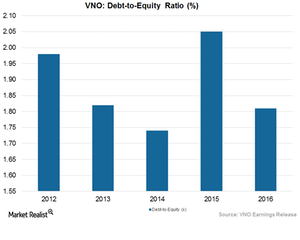How Well Does Vornado Leverage Its Balance Sheet?
Vornado Realty Trust’s (VNO) total debt-to-total-equity ratio was 153.8%.
July 10 2017, Updated 9:05 a.m. ET

Debt leverage is important for REITs
REITs fund their working capital as well as shareholders’ returns through debt financing. For the purpose of acquisitions, expansion, development, and redevelopment, commercial REITs like Vornado Realty Trust (VNO) depend on equity capital and debt financing.
Commercial REITs have to pay at least 90% of their taxable income as dividend or share buybacks in order to function as REITs. However, too much dependency on its debts can result in high interest costs and potential liquidation of the company. As a result, it’s important for a REIT to leverage its balance sheet efficiently.
Debt-to-equity ratio
Vornado Realty Trust (VNO) has reported a higher debt-to-equity ratio in the last five years. The company reported a debt-to-equity ratio of ~1.8x in 1Q17, which ended on March 31, 2017. The company reported respective debt-to-equity ratios of ~1.8x, ~2.1x, ~2.1x, and ~2.1x for the trailing four quarters excluding 1Q17. The median industry debt-to-equity ratio is ~1.1x.
The chart above shows the trend of VNO’s debt-to-equity ratio for the past five years.
Vornado Realty Trust’s (VNO) total debt-to-total-equity ratio was 153.8%. Among its peers, AvalonBay Communities (AVB), Boston Properties (BXP), and Equity Residential (EQR) have total debt-to-total-equity ratios of 69.1%, 169.3%, and 87.9%, respectively.
Vornado, Boston Properties, and Equity Residential make up ~12.4% of the iShares Cohen & Steers REIT ETF (ICF). ICF’s net assets total $3.3 billion, and its expense ratio is 0.35%.
Average interest rates
Vornado Realty Trust’s (VNO) weighted average risk-free interest rate was ~1.8% in 2016, ~1.6% in 2015, and ~1.8% in 2014. Vornado’s interest expenses rose from ~$378.0 million in 2015 to $402.7 million in 2016.
In the next article of this series, we’ll examine VNO’s valuation in comparison to its peers.
